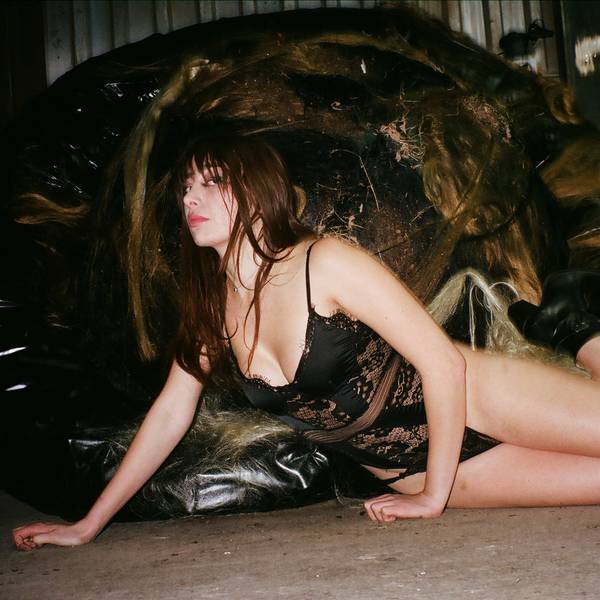
Intima's Joni Built It Just To Burn It Down
Story by Tobias Hess / Photography by Maxwell Vice
Feb 29, 2024
Snuggled against the frenetic buzz of Trans-Pecos, just a hop away from the ever-zinging L train, stands Intima, a raw twist of tin and the temporary home to Ridgewood’s buzziest arts hub.
I was there to see Joni, the performer, artist, DJ and mastermind behind the Intima project, exorcize herself from slumber in a piece titled "Hypnonopomia." As I entered the dark, chilly space, I realized I knew little of what the night held. I had been to other events by Intima, mainly at Market Hotel and H0l0, and was thus familiar with the grimey sublime of the party series, which is known for merging the thrill of performance with the brooding sonics of Brooklyn’s unwieldy queer bohemia. But six months ago, after a long life of roaming, Intima found its temporary nest in the form of a rinky-dink, retired staircase factory in Ridgewood, which, word has it, is set to be turned into a club after Intima’s stint there ends. That night, I learned, was to be one of the space’s last events.
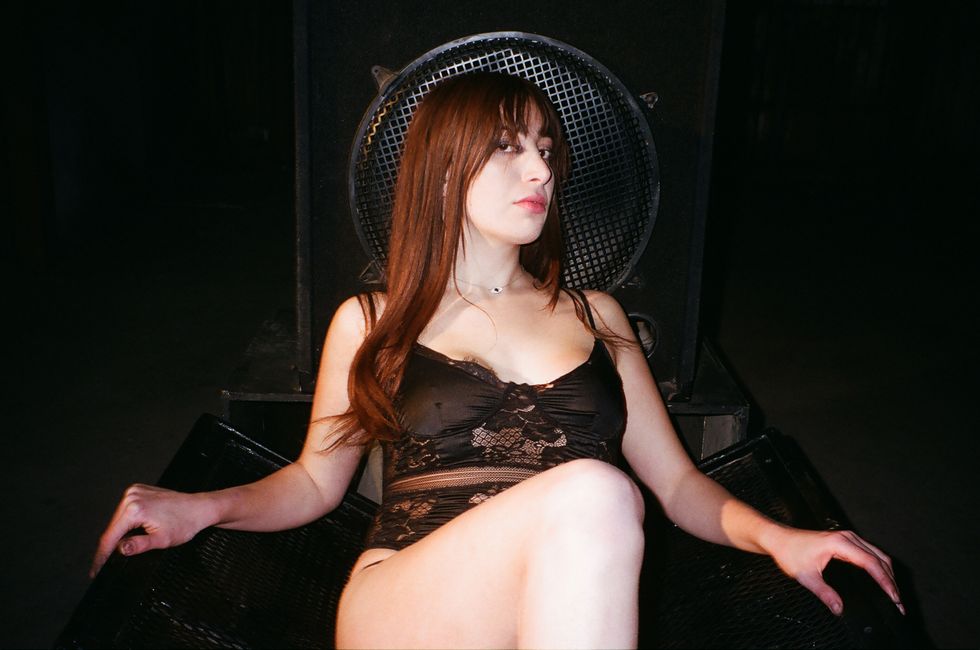
When the show began, Joni emerged from a creaky staircase in the corner. Moving like an insect down the shaky steps, she proceeded to set herself down atop a bed of speakers. There, she was asleep, or waking, or dreaming, or all of the above, intently holding a microphone and cooing, her voice mingling with her own cunning composition that played from the speakers beneath her. At one point, friends and fans alike stood above her, thin candles in hand, and dripped scalding wax on her lingerie-clad body.
She was serene through it all, her gaze staying steady towards the thin, tin ceiling. It was, among other things, a rumination on that unsure state between sleep and wakefulness, a meditation on the body, on sex, and for me, a test of my ability to watch what I perceived as suffering. After the festival of light, Joni arose and crawled towards an out-of-tune piano, playing it with nervous, graceful motions, before ending the piece by wrestling a large, round creature covered in hair, an inflatable thing that ended up punctured and deflated after Joni’s engagement.
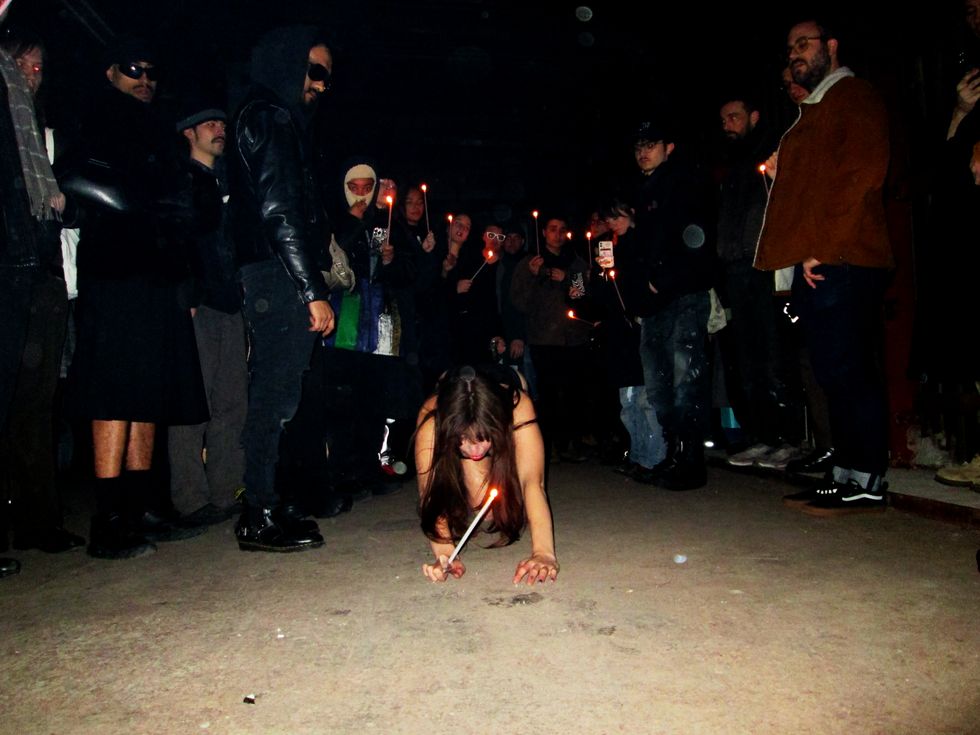
The nightmare was over, and Joni was awake. The crowd applauded in muted, but still moved, motions.
Afterwards, I caught up with Maxi Glenn, a spry, cherubic sound designer and engineer who helped pull off the performance’s overwhelming sonics, and who splits their time between various projects and Ridgewood’s premier club, Basement, where they do sound. “We spent the week on Facebook Marketplace hitting people up for the cheapest and largest quantity of speakers that we could find,” they said of the bed of amplification that Joni rested upon. Glenn told me they were worried the speaker bed would blow out during the performance, but if it did, so be it. “[Intima] is very slapped-together in a lot of ways,” they shared, “so the speakers reflect that. It was all part of it, for things to fall apart.”
Joni found her Ridgewood nook through Todd P, who owns Market Hotel, the Bushwick venue where Joni currently works as its nightlife curator. “We had a six-month transitional state where we were able to catch it [before the space became a club],” Joni said to me a few days after her performance, the wounds from the wax still healing. “And I think I think that’s fitting with what I'm trying to do. The space was changing and shifting, so it was ephemeral, kind of like performance art.”
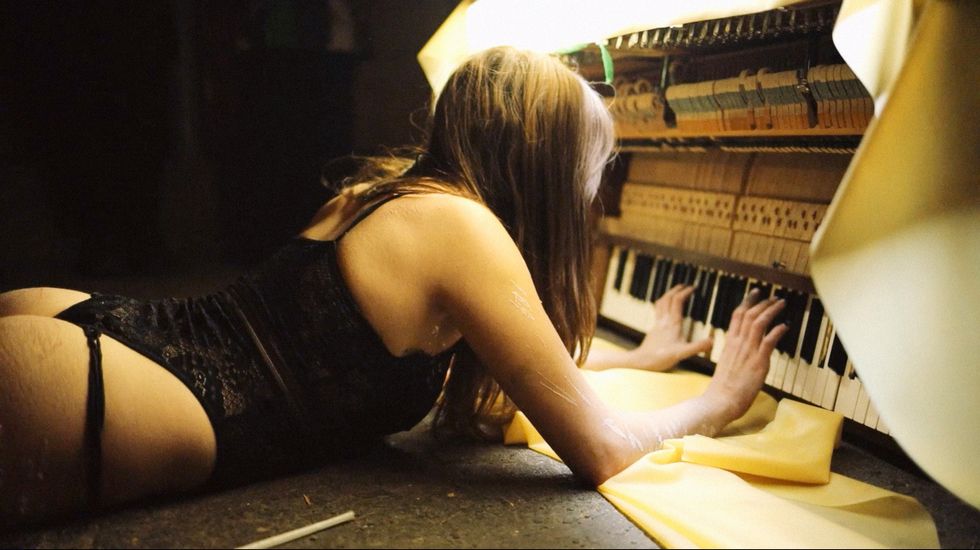
It's that very essence of constant transition that allows for this pure, untethered relationship to art. Without the need to sustain and maintain a perilous business-art equilibrium, Intima can rove around the city and explore. “There are so many good, interesting, amazing artists out there. A space that was not dependent on profit was really needed,” she told me. Joni and Intima have plans for another space soon.
In the short six months since launching, Intima has hosted other bold and current offerings, works such as “Platypussy,” an exhibit of Ruby Zarsky’s angelic, surrealist portraits drawn in colorful clarity; a performance by Reed Rushes and Kate Williams, known together as Exult, who unfurled the tropes of glamor via a surrealist dance with a chic toy car; or “Murder on Myrtle” by Maxwell Vice (whose photos from Hypnonopomia are featured here), for “a performance piece by [a] Bushwick/Ridgewood native inspired by the displacement of Native New Yorkers, and the claustrophobic feelings of their gentrified hometown.”
“I think there's something really important happening with the culture here,” Joni told me. Too important, she reflected, to let the status quo stand. “Everything [in New York] is very institutionalized. And places that used to be DIY are [becoming] institutionalized and profit-based.” So instead of trying to fit the square peg of art into the round hole that is the tedium of business, Joni made her own way. “I'm just not the type of girl that's going to wait for people to give me the opportunity,” she said. After noticing the ways that certain members of the fine art world would “give themselves [opportunities] over and over again, [by giving] the same stages to make the same money from the same people,” she started throwing her own parties and enacting her own ritualistic performances in nightlife environments, thus beginning her art career in the clubs rather than the galleries.
Today, Intima is at the center of a thriving community of like-minded artists and practitioners. And it's also the focus of the art world, who has taken interest in Intima and Joni’s admirable abandon. MoMA PS1 tapped Joni to curate “Warm Up,” its summer rave series. And now Joni is set to do a residency with Issue Project Room for a series of performances.
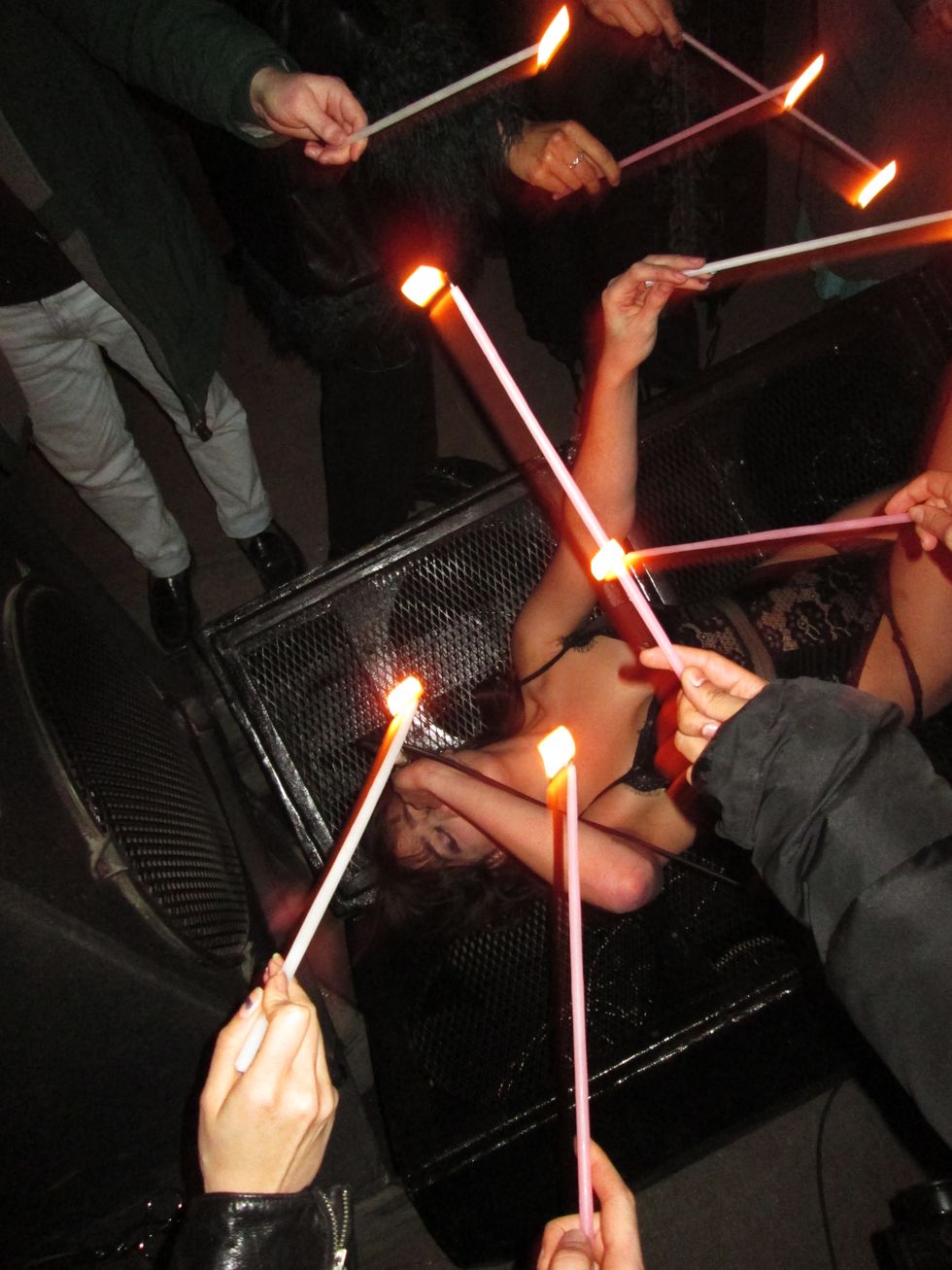
“There's a real movement happening in New York right now of artists taking things into their own hands and making it happen, and abandoning the promises of the institution,” Joni told me. “I think it's coming as a direct counter-reaction to what's happening with the recession and the wars that the US is leading around the world. People are disillusioned.” That disillusionment, she tells me, is leading to a groundswell of self-starting artists, breaking away from the confines and pressures of existing structures.
“People are also tired of being banners of identities,” she relented. “I hope the culture is more open to complexity and mystery.” I agreed. We hadn’t talked about “gender” or “identity” during our whole discussion, nor did we need to. “I never really thought about gender, but sex is a whole different thing,” she said. “I think about sex very often.”
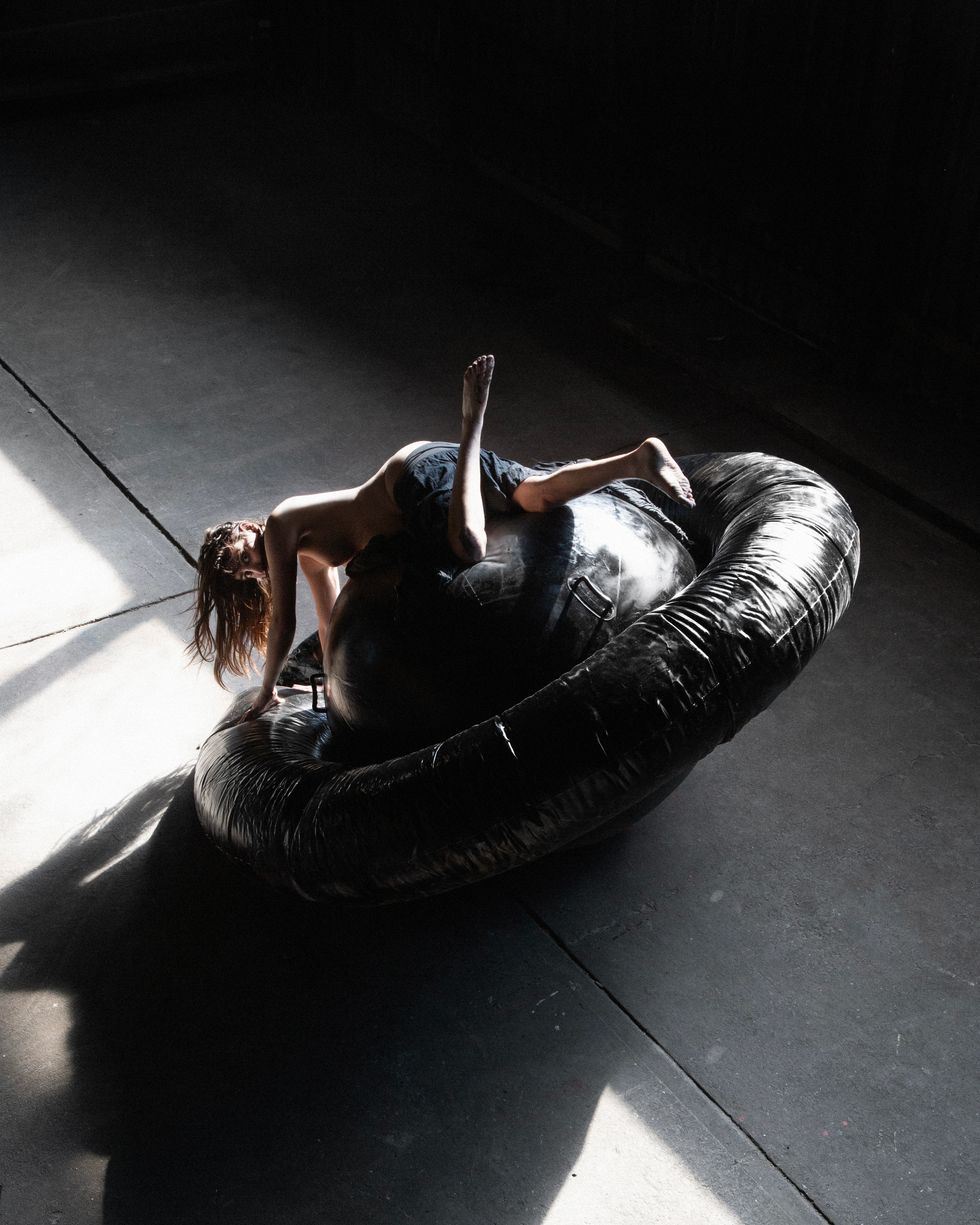
I laughed. I think I knew what she meant. It was an eminently practical response from a body performer, after all. It’s clear to me that her interests reside in the question of materiality and flesh. The body which changes. The body which grows. The body which falls apart and heals.
The body, I realized, is much like a space: subject to revision. A staircase factory. A club. A stage. A dream. A nightmare. A home for a speaker screaming out bass, only if you can catch it before it explodes.
Photography: Maxwell Vice
MORE ON PAPER
Cardi B sorprende con una presentación inesperada y deja a todos “Ready Pa’l Show”
Español
Feb 14, 2026
ATF Story
Madison Beer, Her Way
Photography by Davis Bates / Story by Alaska Riley
Photography by Davis Bates / Story by Alaska Riley
16 January
Entertainment
Cynthia Erivo in Full Bloom
Photography by David LaChapelle / Story by Joan Summers / Styling by Jason Bolden / Makeup by Joanna Simkim / Nails by Shea Osei
Photography by David LaChapelle / Story by Joan Summers / Styling by Jason Bolden / Makeup by Joanna Simkim / Nails by Shea Osei
01 December
Entertainment
Rami Malek Is Certifiably Unserious
Story by Joan Summers / Photography by Adam Powell
Story by Joan Summers / Photography by Adam Powell
14 November
Music
Janelle Monáe, HalloQueen
Story by Ivan Guzman / Photography by Pol Kurucz/ Styling by Alexandra Mandelkorn/ Hair by Nikki Nelms/ Makeup by Sasha Glasser/ Nails by Juan Alvear/ Set design by Krystall Schott
Story by Ivan Guzman / Photography by Pol Kurucz/ Styling by Alexandra Mandelkorn/ Hair by Nikki Nelms/ Makeup by Sasha Glasser/ Nails by Juan Alvear/ Set design by Krystall Schott
27 October
Music
You Don’t Move Cardi B
Story by Erica Campbell / Photography by Jora Frantzis / Styling by Kollin Carter/ Hair by Tokyo Stylez/ Makeup by Erika LaPearl/ Nails by Coca Nguyen/ Set design by Allegra Peyton
Story by Erica Campbell / Photography by Jora Frantzis / Styling by Kollin Carter/ Hair by Tokyo Stylez/ Makeup by Erika LaPearl/ Nails by Coca Nguyen/ Set design by Allegra Peyton
14 October




